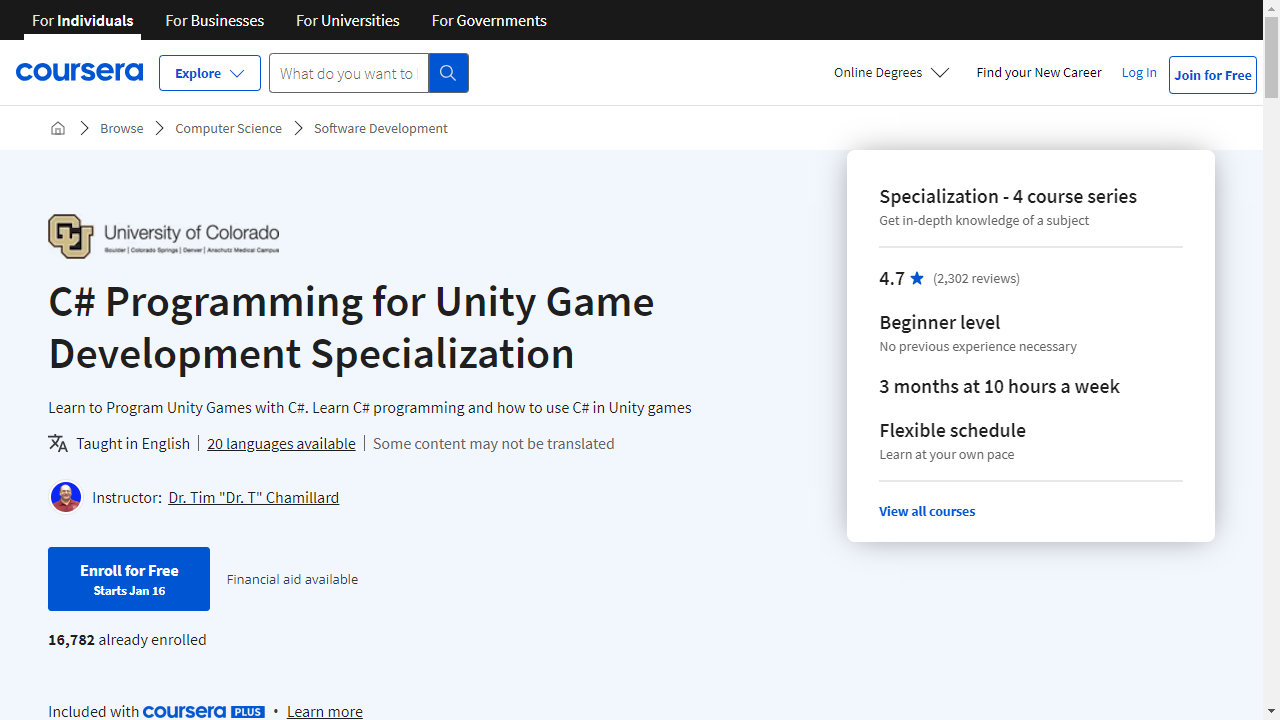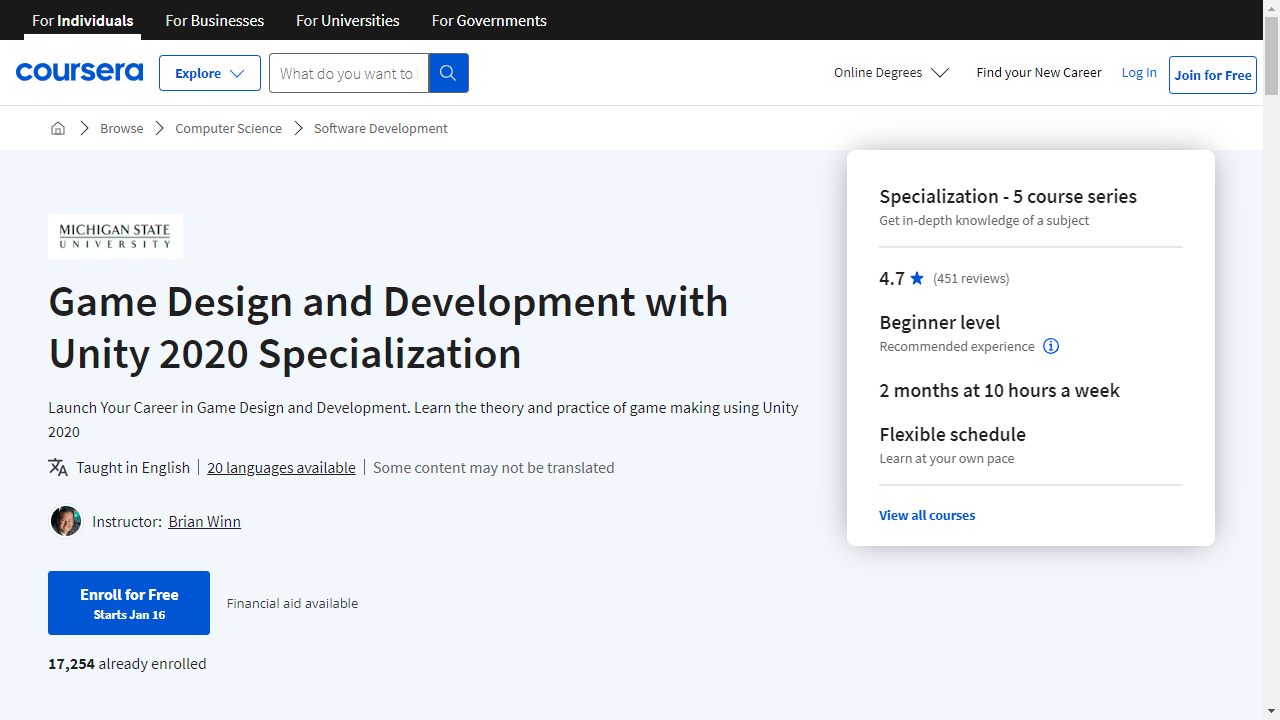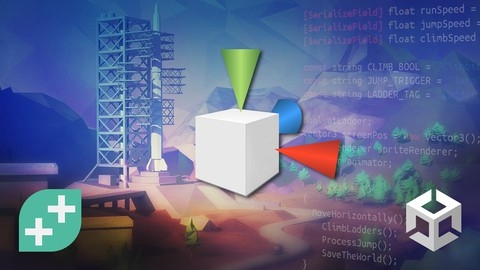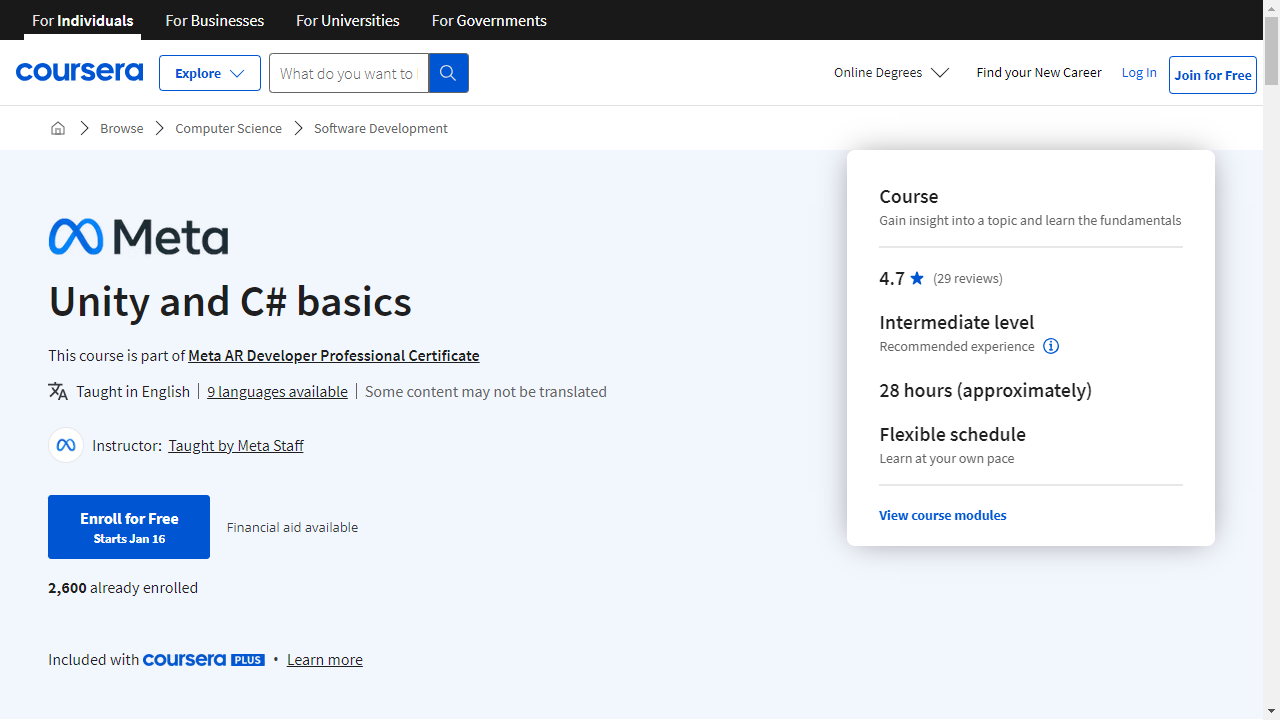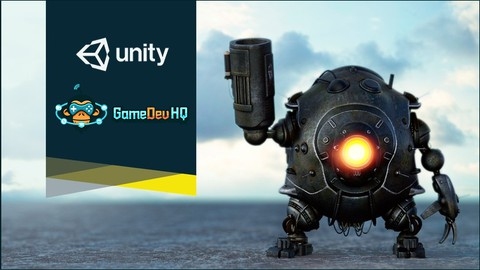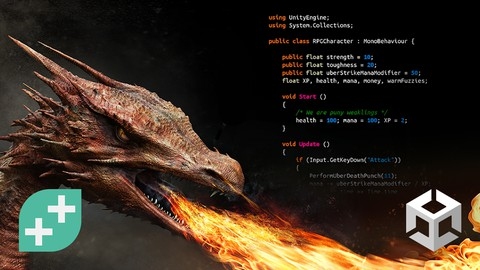Unity game development is a thrilling and rewarding field, allowing you to bring your creative ideas to life in the form of interactive games.
By learning Unity, you gain the power to design immersive worlds, craft engaging gameplay mechanics, and build experiences that captivate players.
Whether you aspire to create indie games, contribute to AAA projects, or simply explore the realm of game development, mastering Unity is a crucial step.
However, with numerous Unity courses available online, finding the perfect one that aligns with your learning style and goals can be a challenge.
You’re looking for a course that’s comprehensive, engaging, and taught by experienced instructors who can guide you through the complexities of Unity’s interface and scripting language.
Based on our thorough analysis, we’ve identified C# Programming for Unity Game Development Specialization on Coursera as the best course overall.
This specialization offers a structured and in-depth learning experience, covering both C# programming fundamentals and their application within the Unity engine.
It’s an excellent choice for beginners with no prior programming experience, as well as those seeking to solidify their understanding of Unity game development.
While C# Programming for Unity Game Development Specialization is our top recommendation, we understand that different learners have unique preferences and needs.
That’s why we’ve compiled a diverse list of Unity courses catering to various skill levels, learning styles, and specific areas of interest.
So, keep reading to discover the perfect Unity course to embark on your game development journey.
C# Programming for Unity Game Development Specialization
Provider: Coursera
This specialization on Coursera is a fantastic way to learn how to develop video games using C# and Unity, even if you’ve never written a line of code before.
You will begin with the very basics, learning how to write simple C# console applications and Unity scripts.
You quickly build upon this foundation, exploring how to store data in your programs using variables, classes, and objects.
As you progress, you’ll tackle core programming concepts like decision-making (using conditional statements), getting input from the player, and using loops to repeat actions in your code.
Don’t be fooled by the beginner-friendly approach, this specialization dives deep into the world of C# programming and Unity game development.
You’ll grapple with object-oriented programming (OOP) concepts like abstraction, methods, and how to design and implement classes.
You’ll learn how to use files to save and load game data, creating more robust games.
You’ll even delve into powerful techniques like inheritance and polymorphism, which help you write cleaner, more efficient, and reusable code.
This course doesn’t just throw concepts at you; it guides you through applying your knowledge.
You will create 2D games, learning how to bring them to life with features like text output, sound effects, and menus.
The course culminates in building a fully functional Unity game, allowing you to put everything you’ve learned into practice.
Think of it as a college-level crash course in C# and Unity game development, conveniently accessible at your own pace.
Complete C# Unity Game Developer 2D
Provider: Udemy
This Udemy course takes you from knowing nothing about C# and Unity to creating fully functional 2D games.
You’ll begin by installing Unity 2021.1 and Visual Studio Code.
The instructor then guides you through creating a series of games.
You’ll start with simple games, such as a delivery driver, and gradually advance to more complex projects like a snowboarding game and a quiz game.
As you progress through these projects, you’ll learn the fundamentals of C# programming.
This includes working with essential concepts like variables, methods, and loops.
You will use these concepts to build the game logic, control game objects, and create interactive experiences.
You’ll dive into specific techniques like using Transform.Translate() to move objects, Input.GetAxis() to capture player input, and OnCollisionEnter2D to handle collisions between game objects.
The course doesn’t shy away from advanced Unity features.
You’ll learn how to utilize powerful tools like Tilemap for level design, Cinemachine for dynamic camera movements, and particle effects for visual enhancements.
You’ll understand how to use Scriptable Objects for efficient game data management.
You’ll also discover the singleton pattern, a design pattern frequently used for managing game objects that persist across different game scenes.
The final section challenges you to build a complete TileVania-style platformer game.
You’ll apply your knowledge of Tilemap to design intricate levels.
You’ll learn how to work with Prefabs to create reusable game objects.
You’ll use Rigidbodies and Colliders to implement realistic physics interactions, and bring your characters to life with Animation States.
Finally, you’ll use Cinemachine to implement a smooth camera follow system.
Game Design and Development with Unity 2020 Specialization
Provider: Coursera
This Michigan State University specialization takes you on a structured Unity journey, beginning with the fundamentals of game creation using Unity 2020.
Your first steps involve diving into 2D game development, learning the ropes by crafting a 2D shooter and then a 2D platformer.
This stage introduces you to the Unity interface, teaches you essential scripting, and familiarizes you with game mechanics.
You then level up to the world of 3D games, building both a 3D shooter and a 3D platformer.
This is where you’ll tackle more complex concepts like level design, creating immersive 3D environments, and scripting intricate interactions.
Throughout this process, you gain experience in prototyping, testing your game, and refining its balance.
You even delve into creating your own game assets, giving your projects a unique visual flair.
The specialization culminates in a capstone project, where you design and develop your own original game from scratch.
You put all your acquired skills to the test, taking your game from a mere idea to a fully playable experience.
Plus, you get the incredible opportunity to showcase your work and receive feedback from industry veterans at renowned game studios like Riot Games, Blizzard Entertainment, Insomniac Games, and more.
Their insights provide invaluable guidance and real-world context to your learning experience.
Complete C# Unity Game Developer 3D
Provider: Udemy
This Unity course begins with the fundamentals, guiding you through setting up Unity and Visual Studio Code.
You’ll grasp the basics of C# scripting and prefabs, laying the groundwork for building your first game.
Don’t worry; the course takes a hands-on approach, so you’ll be coding and creating right from the start.
Your first game is an obstacle course where you will apply C# concepts like variables, methods, and conditional statements.
You’ll use transform.Translate() to move your player, Input.GetAxis() for input control, and learn about collision detection with OnCollisionEnter().
As you progress, you’ll build “Project Boost,” a rocket-based game that introduces you to classes for organizing your code and the power of audio management with sound effects.
You’ll control the rocket’s movement using AddRelativeForce(), create level transitions with SceneManager.LoadScene(), and enhance the game’s visuals with particle effects.
Next, you will dive into “Argon Assault,” a rail shooter game where you’ll learn about terrain creation, using the Unity Timeline to create cinematic sequences, and how to implement the new Unity Input System.
You’ll use GetAxis() for precise player movement and Quaternion.Euler() to make sure everything rotates correctly.
The final game, “Realm Rush,” is a tower defense game that challenges you with pathfinding algorithms like Breadth First Search and object pooling for efficient object management.
You’ll even design your own currency system and UI elements.
This course equips you with a strong understanding of C# programming, a variety of Unity’s features, and the ability to create different genres of games.
You’ll gain a solid foundation to pursue more ambitious game development projects.
Unity and C# basics
Provider: Coursera
This Coursera course equips you with the foundational knowledge of Unity and C#, focusing on building augmented reality (AR) experiences.
You start by getting acquainted with the Unity interface, learning to set up projects, and navigating the Unity Editor.
You also discover how to effectively manage time and documentation, essential skills for AR project development.
You then transition into the world of C# scripting, learning the language’s fundamental syntax and its application within Unity.
You’ll practice writing scripts that control the behavior of game objects, such as their position, rotation, and scale.
You’ll also delve into data types, arrays, and working with objects in your games.
The course guides you through two hands-on projects: an AR arcade game and a “Food Flight” game.
You’ll learn to use the Unity scripting API library to interact with game objects and create unique experiences.
You’ll create a simple AR bowling game, incorporating physics concepts like forces, torque, and collisions.
In the “Food Flight” game, you’ll control a player launching projectiles at animals, learning about player movement, projectile physics, spawning game objects, and implementing game-over conditions.
You’ll create scripts, manipulate game objects, implement physics, and manage player input.
The course provides a solid foundation for further exploration in AR development, preparing you to create your own engaging and interactive experiences.
The Ultimate Guide to Game Development with Unity (Official)
Provider: Udemy
This Unity course teaches you how to make games from start to finish, whether you’re new to Unity or have some experience.
You start by building a complete space shooter game called Galaxy Shooter.
This project teaches you the basics of the Unity interface, how to use C# code to build game features, and how to make your game work on different platforms like PC and Android.
You then level up your skills by creating a 2D mobile game called Dungeon Escape.
This section dives into using Tilemap to design levels, crafting smart enemy AI, and even adding things like a loot system and player health.
You’ll even learn how to put ads in your game and publish it on the Google Play Store so others can download and play it.
If you want to make games with amazing cutscenes, this course also teaches you how to use Timeline and Cinemamachine.
You’ll learn professional techniques to create movie-like sequences for your games.
You’ll also master important C# coding concepts like inheritance and interfaces, which help you write better, more organized code for bigger projects.
RPG Core Combat Creator: Learn Intermediate Unity C# Coding
Provider: Udemy
This Udemy course will take you on a journey to learn intermediate Unity C# coding by building the core combat system for an RPG.
You will quickly build your skills from basic movement to more complex topics like raycasting.
With raycasting, you’ll learn how to detect objects in your game, such as when your character walks into a wall.
You will use it to add the “click-to-move” functionality, which lets your character move to where you click your mouse.
This course does not shy away from more advanced topics.
You will learn how to use code to implement combat, including attack animations and a system for dealing and taking damage.
Then, you will learn how to add enemy AI that will make your enemies come alive.
They will be able to chase you, patrol an area, and even guard a specific location.
To make things even more interesting, you will also use tools like Cinemachine and Timeline to create exciting cutscenes, like those you see in your favorite RPGs.
You will then dive into scene management.
This is where you will learn how to move your character between different levels in your game, such as entering a building or traveling to a new area.
This involves using techniques like asynchronous level loading and coroutines.
And since no RPG is complete without a way to save your progress, you’ll learn how to do this using C#’s BinaryFormatter.
As you progress, you will get hands-on experience with weapon systems.
You will learn how to create swords, bows, and even fireballs.
Finally, the course covers how to level up your character.
You will learn how to increase your character’s health, damage, and other stats.
This involves using techniques like events, delegates, and a flexible modifier system, making your RPG feel even more in-depth and rewarding.
Also check our posts on:
